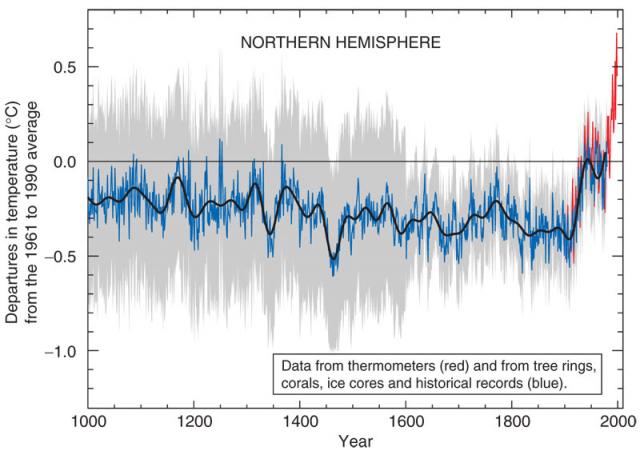“Independent” Hockey Stick analysis revealed as Republican set-up
The purportedly independent report that Dr. Edward Wegman prepared in 2006 for the Congressional Committee on Energy and Commerce was actually a partisan set-up, according to information revealed today.
Wegman, who had presented himself as an impartial “referee” between two “teams” debating the quality of the so-called Hockey Stick graph was, in fact, coached throughout his review by Republican staffer Peter Spencer. Wegman and his colleagues also worked closely with one of the teams (and especially with retired mining stock promoter Stephen McIntyre) to try to replicate criticism of the Hockey Stick graph, while at the same time foregoing contact with the actual authors of the seminal climate reconstruction.
The Hockey Stick refers to a graph (by Michael Mann, Raymond Bradley and Malcolm Hughes) that became a defining image of the Third Assessment Report of the Intergovernmental Panel on Climate Change (IPCC). It also became a target for Steve McIntyre and the Guelph University economist Ross McKitrick, who since 2002, at least, has been a paid spokesperson for ExxonMobil-backed think tanks such as the Competitive Enterprise Institute (CEI) and the Fraser Institute.
According to a detailed analysis by the blogger Deep Climate, McIntyre and McKitrick’s criticism of the Hockey Stick graph was aggressively promoted and disseminated by an echo chamber of think tanks and blogs, all of which had financial or ideological associations with fossil fuel industry funders.
Then, in 2005, (and perhaps through the machinations of CEI climate specialist Myron Ebell), Republican Rep. and Energy and Commerce Committee Chair Joe Barton began calling for an investigation into the graph. But Barton rejected an offer from National Academy of Sciences President Ralph Ciccerone to conduct a formal and independent review in the highly professional manner typical of the nation’s foremost scientific body. Barton chose, instead, to engage a statistician (Wegman) from one of the most conservative institutions in the country (George Mason University) and to task him with setting up a team to dissect Mann’s Hockey Stick.
The result was predictable. Collaborating with McIntyre, Wegman’s team recreated and then endorsed the critical view of Michael Mann’s work. According to earlier revelations from Deep Climate, Wegman also cribbed – arguably plagiarized – work from Raymond Bradley, lifting whole sections of his 1999 textbook, but periodically changing material or inserting information calculated to cast doubt on the reliability of tree-ring data (the source of the MBH climate reconstruction). In the most outrageous example, suspiciously unattributed, Wegman’s report actually suggested that tree rings might be affected positively by automobile pollution. (“… oxides of nitrogen are formed in internal combustion engines that can be deposited as nitrates also contributing to fertilization of plant materials.”)
All this could be dismissed as typical politicking except for two things. First, because this was presented as an independent and impartial review, it is reasonable to ask whether Barton, Wegman, et al, are guilty of misleading Congress, a felony offense.
Second, the same echo chamber that promoted Steve McIntyre’s criticism of the Hockey Stick is now fully engaged accusing scientists of manipulating data to increase global concern about climate change. The manipulation of both data and public opinion are certainly evident in this story. Science has most certainly been politicized. But (thanks to Deep Climate’s careful research) the record shows that the manipulation and politicization has been bought and paid for by the energy industry and executed by a sprawling network of think tanks and blogs – and by leading Republicans and their staffers.
This is, at the very least, fodder for a Congressional investigation as to whether the Energy and Commerce Committee was, indeed, intentionally and perhaps disastrously misled.
Subscribe to our newsletter
Stay up to date with DeSmog news and alerts






